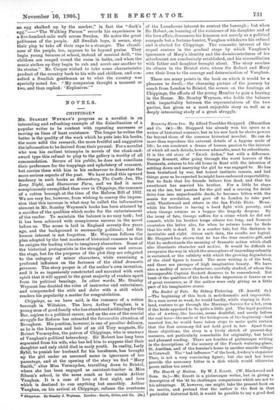Bunning Horse Inn. By Alfred Tresidder Sheppard. (Macmillan and Co.
65.)—Mr. Sheppard has already won his spurs as a writer of historical romance, but in his new book he shows powers far beyond those of the common historical novelist. Ho can do more than -reproduce the external details of a bygone mode of
life ; be can construct a drama of human passion to the interest of which all such details, however admirable, must be subordinate. It is the old story of "Enoch Arden." but with a difference.
George Kennett, after going through the worst horrors of the Peninsula, returns to his old home in Kent with the intention of settling down and marrying the girl he was engaged to. He has been brutalised by war, but honest instincts remain, and had things gone as he expected he might have embraced respectability. But ho finds that his friends believe him dead, and that his
sweetheart has married his brother. For a little he stays on at the inn, but passion for the girl and a craving for drink drive him into unpardonable deeds, he becomes bitten with the
mania for revolution, and goes off to London to take part with Thistlewood and others in the Spa Fields Riots. Mean- while his brother is having a hard fight with poverty, and when George returns as a beggar the tragedy deepens. By the irony of fate, George suffers for a crime which he did not commit, while his brother keeps silence too long, and Nemesis overtakes the latter also, for when he returns home he finds that his wife is dead. It is a sombre tale, but the darkness is inevitable and right. Given such data, the results are logical.
Mr. Sheppard has shown that he has the true creative gift, and that he understands the meaning of dramatic action which shall also illuminate character and motive. It would be difficult to overpraise the way in which the atmosphere of impending calamity is sustained, or the subtlety with which the growing degradation of the chief figure is traced. The mere writing is of the best, and there are passages of high imaginative beauty. We have
also a medley of minor characters, carefully studied, of whom the incomparable Captain Beckett deserves to be remembered. Not least of the qualities of the book is the impression it leaves on us of great resources, as if the author were only giving us a little part of his imaginative stores.














































 Previous page
Previous page